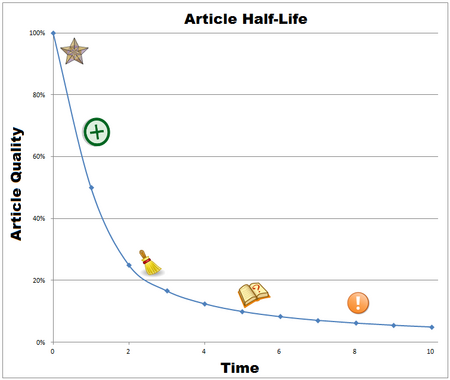Wikipedia:Article half-life
This is an essay. It contains the advice or opinions of one or more Wikipedia contributors. This page is not an encyclopedia article, nor is it one of Wikipedia's policies or guidelines, as it has not been thoroughly vetted by the community. Some essays represent widespread norms; others only represent minority viewpoints. |
| This page in a nutshell: Keep maintaining articles to avoid degradation. |

Congratulations! You just wrote a sweet article on...something. You used reliable sources that satisfy the general notability guideline. All of the facts are verifiable and avoid pushing a point-of-view. The freely licensed or legitimate fair use images illustrate the article. The writing is well-crafted, so well-crafted in fact that the article is probably a good article. If you're really good, the article might even be a featured article some day.
That's not enough. You see, every article has a half-life.
The phrase "Half-life" describes the time it takes for a substance to degrade to half its former quantity. The term is most often used within the context of radioactive decay.
Over time, vandalism, disruptive editing, unhelpful edits, hoaxes, original research, link rot, rising quality standards, and a lack of updating the article regarding new scholarship and new findings on the topic will all degrade an article's quality. Like radioactive decay, your featured article will degrade into a good article, and then into a poor quality article which then will require serious cleanup and improvement work.
The half-life for every article is different, but every article, no matter what the quality, will eventually degrade.
Often, the big edits like page blanking or joke edits will likely draw attention from even casual editors. It can be the minor edits that cause the most damage. Maybe a new user unintentionally breaks a source URL or wikilink, or a careless user adds incorrect information interspersed with correct additions. These edits add up surprisingly quickly.
Remember that the long-term quality of an article depends on your continued effort to update and cleanup over time, not just the initial effort. Keep an eye on articles through your watch list and periodically review them, and while you are there, prune out OR and vandalism and remove unsourced quotations and biased POV additions.
See also
[edit]- Wikipedia:Build content to endure (proactive steps to prevent degradation)

